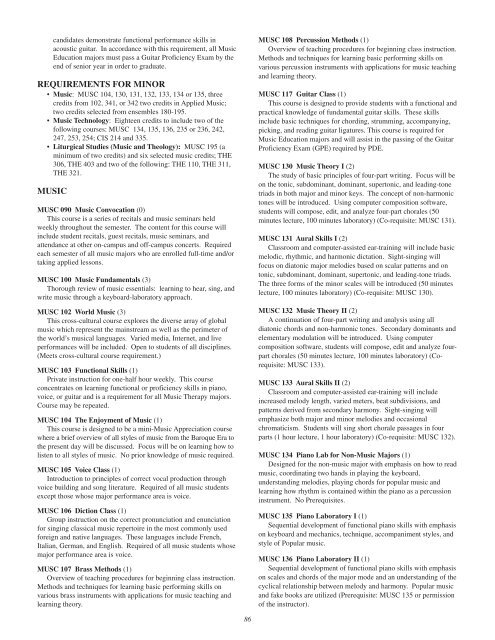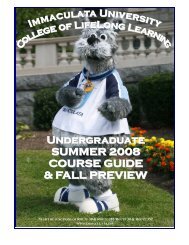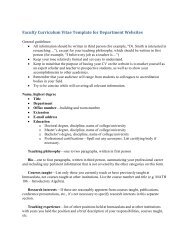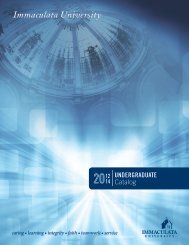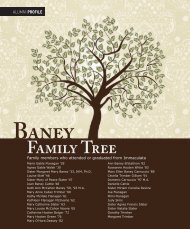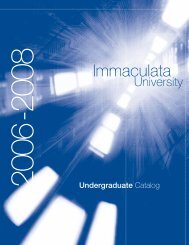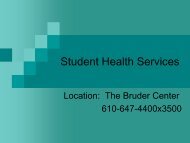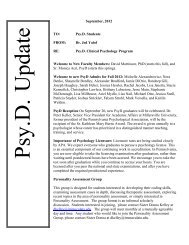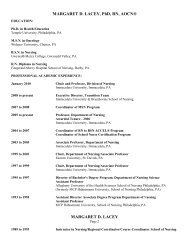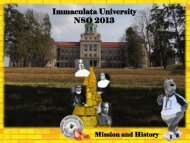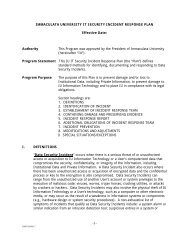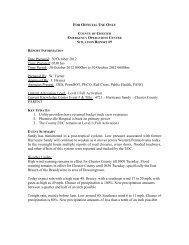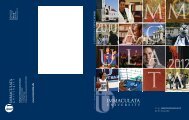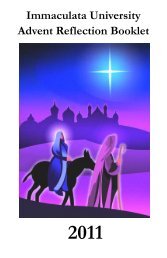Undergraduate Catalog 2008-2010 - Immaculata University
Undergraduate Catalog 2008-2010 - Immaculata University
Undergraduate Catalog 2008-2010 - Immaculata University
You also want an ePaper? Increase the reach of your titles
YUMPU automatically turns print PDFs into web optimized ePapers that Google loves.
candidates demonstrate functional performance skills in<br />
acoustic guitar. In accordance with this requirement, all Music<br />
Education majors must pass a Guitar Proficiency Exam by the<br />
end of senior year in order to graduate.<br />
REQUIREMENTS FOR MINOR<br />
• Music: MUSC 104, 130, 131, 132, 133, 134 or 135, three<br />
credits from 102, 341, or 342 two credits in Applied Music;<br />
two credits selected from ensembles 180-195.<br />
• Music Technology: Eighteen credits to include two of the<br />
following courses: MUSC 134, 135, 136, 235 or 236, 242,<br />
247, 253, 254; CIS 214 and 335.<br />
• Liturgical Studies (Music and Theology): MUSC 195 (a<br />
minimum of two credits) and six selected music credits; THE<br />
306, THE 403 and two of the following: THE 110, THE 311,<br />
THE 321.<br />
MUSIC<br />
MUSC 090 Music Convocation (0)<br />
This course is a series of recitals and music seminars held<br />
weekly throughout the semester. The content for this course will<br />
include student recitals, guest recitals, music seminars, and<br />
attendance at other on-campus and off-campus concerts. Required<br />
each semester of all music majors who are enrolled full-time and/or<br />
taking applied lessons.<br />
MUSC 100 Music Fundamentals (3)<br />
Thorough review of music essentials: learning to hear, sing, and<br />
write music through a keyboard-laboratory approach.<br />
MUSC 102 World Music (3)<br />
This cross-cultural course explores the diverse array of global<br />
music which represent the mainstream as well as the perimeter of<br />
the world’s musical languages. Varied media, Internet, and live<br />
performances will be included. Open to students of all disciplines.<br />
(Meets cross-cultural course requirement.)<br />
MUSC 103 Functional Skills (1)<br />
Private instruction for one-half hour weekly. This course<br />
concentrates on learning functional or proficiency skills in piano,<br />
voice, or guitar and is a requirement for all Music Therapy majors.<br />
Course may be repeated.<br />
MUSC 104 The Enjoyment of Music (1)<br />
This course is designed to be a mini-Music Appreciation course<br />
where a brief overview of all styles of music from the Baroque Era to<br />
the present day will be discussed. Focus will be on learning how to<br />
listen to all styles of music. No prior knowledge of music required.<br />
MUSC 105 Voice Class (1)<br />
Introduction to principles of correct vocal production through<br />
voice building and song literature. Required of all music students<br />
except those whose major performance area is voice.<br />
MUSC 106 Diction Class (1)<br />
Group instruction on the correct pronunciation and enunciation<br />
for singing classical music repertoire in the most commonly used<br />
foreign and native languages. These languages include French,<br />
Italian, German, and English. Required of all music students whose<br />
major performance area is voice.<br />
MUSC 107 Brass Methods (1)<br />
Overview of teaching procedures for beginning class instruction.<br />
Methods and techniques for learning basic performing skills on<br />
various brass instruments with applications for music teaching and<br />
learning theory.<br />
MUSC 108 Percussion Methods (1)<br />
Overview of teaching procedures for beginning class instruction.<br />
Methods and techniques for learning basic performing skills on<br />
various percussion instruments with applications for music teaching<br />
and learning theory.<br />
MUSC 117 Guitar Class (1)<br />
This course is designed to provide students with a functional and<br />
practical knowledge of fundamental guitar skills. These skills<br />
include basic techniques for chording, strumming, accompanying,<br />
picking, and reading guitar ligatures. This course is required for<br />
Music Education majors and will assist in the passing of the Guitar<br />
Proficiency Exam (GPE) required by PDE.<br />
MUSC 130 Music Theory I (2)<br />
The study of basic principles of four-part writing. Focus will be<br />
on the tonic, subdominant, dominant, supertonic, and leading-tone<br />
triads in both major and minor keys. The concept of non-harmonic<br />
tones will be introduced. Using computer composition software,<br />
students will compose, edit, and analyze four-part chorales (50<br />
minutes lecture, 100 minutes laboratory) (Co-requisite: MUSC 131).<br />
MUSC 131 Aural Skills I (2)<br />
Classroom and computer-assisted ear-training will include basic<br />
melodic, rhythmic, and harmonic dictation. Sight-singing will<br />
focus on diatonic major melodies based on scalar patterns and on<br />
tonic, subdominant, dominant, supertonic, and leading-tone triads.<br />
The three forms of the minor scales will be introduced (50 minutes<br />
lecture, 100 minutes laboratory) (Co-requisite: MUSC 130).<br />
MUSC 132 Music Theory II (2)<br />
A continuation of four-part writing and analysis using all<br />
diatonic chords and non-harmonic tones. Secondary dominants and<br />
elementary modulation will be introduced. Using computer<br />
composition software, students will compose, edit and analyze fourpart<br />
chorales (50 minutes lecture, 100 minutes laboratory) (Corequisite:<br />
MUSC 133).<br />
MUSC 133 Aural Skills II (2)<br />
Classroom and computer-assisted ear-training will include<br />
increased melody length, varied meters, beat subdivisions, and<br />
patterns derived from secondary harmony. Sight-singing will<br />
emphasize both major and minor melodies and occasional<br />
chromaticism. Students will sing short chorale passages in four<br />
parts (1 hour lecture, 1 hour laboratory) (Co-requisite: MUSC 132).<br />
MUSC 134 Piano Lab for Non-Music Majors (1)<br />
Designed for the non-music major with emphasis on how to read<br />
music, coordinating two hands in playing the keyboard,<br />
understanding melodies, playing chords for popular music and<br />
learning how rhythm is contained within the piano as a percussion<br />
instrument. No Prerequisites.<br />
MUSC 135 Piano Laboratory I (1)<br />
Sequential development of functional piano skills with emphasis<br />
on keyboard and mechanics, technique, accompaniment styles, and<br />
style of Popular music.<br />
MUSC 136 Piano Laboratory II (1)<br />
Sequential development of functional piano skills with emphasis<br />
on scales and chords of the major mode and an understanding of the<br />
cyclical relationship between melody and harmony. Popular music<br />
and fake books are utilized (Prerequisite: MUSC 135 or permission<br />
of the instructor).<br />
86


